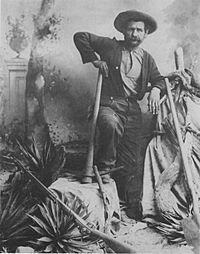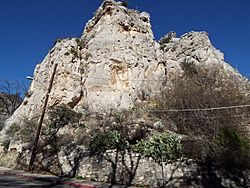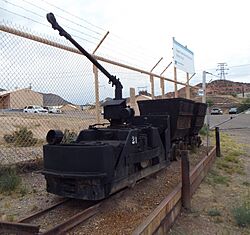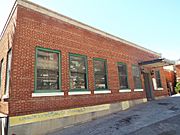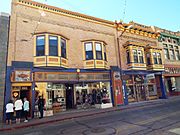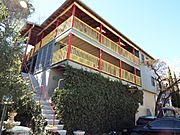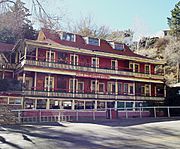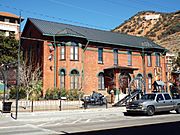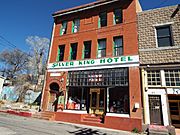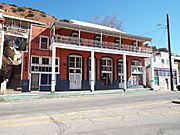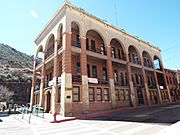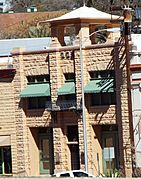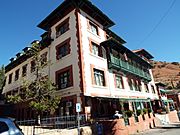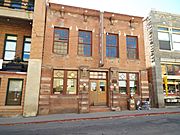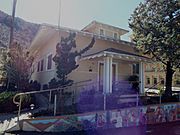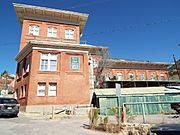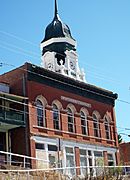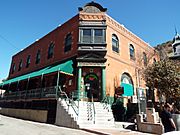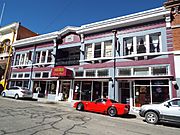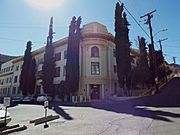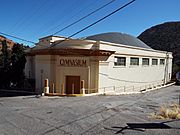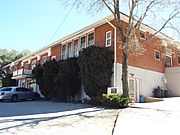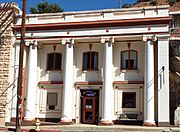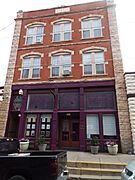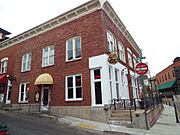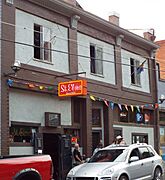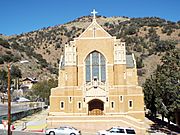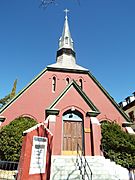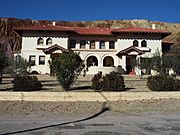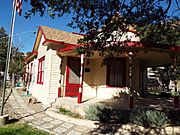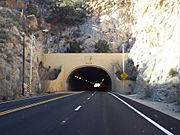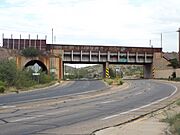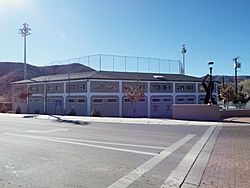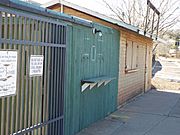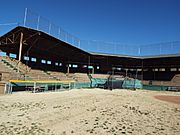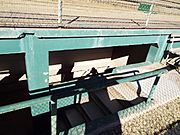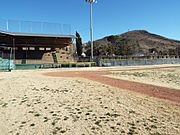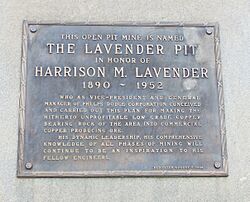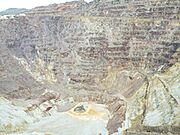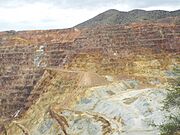List of historic properties in Bisbee, Arizona facts for kids
Quick facts for kids
List of historic properties
in Bisbee, Arizona |
|
|---|---|
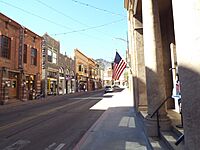
View of Bisbee’s Main Street.
|
|
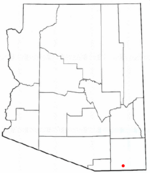
Location in Cochise County and the state of Arizona
|
This article shares a list of amazing historic buildings and places in Bisbee, Arizona. You'll also find a photo gallery of some of these special spots. Most of these buildings are part of the Bisbee Historic District. This area was added to the National Register of Historic Places on July 3, 1980. Another important area is the Bisbee Residential Historic District, added on October 15, 2010.
Some buildings are so important they are listed on their own. These include the Phelps Dodge Headquarters Building, the Muheim House, the Bisbee Women's Club House, St. Patrick's Roman Catholic Church, and the Walter Douglas House. These places help us remember Bisbee's rich past!
Contents
Bisbee's Early Days
Imagine a hot summer day in 1877. An Army Scout named Jack Dunn was getting water for his friends near a place called Castle Rock. There, he found shiny copper ore! This discovery led to the very first mining claim in what would soon become Bisbee. Many people, hoping to find their fortune, rushed to the mountains of Bisbee.
Because so much ore was found, Bisbee became known as the "Queen of the Copper Camps." By the late 1800s, Bisbee was one of the biggest cities between St. Louis and San Francisco!
Jack Dunn and his officer, Lt. John Rucker, met a prospector named George Warren. They asked Warren to officially claim the land for them. But Warren didn't keep his promise. Instead, he started what was called the Warren Mining District. He even owned a small part of the new Copper Queen mine.
The Phelps Dodge Company's Role
The Phelps Dodge Company from Pennsylvania was a big mining business. They sent James Douglas, who was very good at finding new ways to get copper from the ground, to check out potential mines in Arizona.
Phelps Dodge started mining in Arizona in the 1880s. At first, there were arguments over who owned which parts of the ore. To avoid problems, Phelps Dodge bought the Copper Queen mine. They combined it with another claim they had, called Atlanta.
In 1896, Phelps Dodge set up its main office in the Phelps Dodge Headquarters Building at 5 Copper Queen Plaza. James Douglas, who was in charge of the Copper Queen mine, started many programs for the miners in Bisbee. Phelps Dodge built many important buildings for its workers and the town. These included the Copper Queen Hospital, the Copper Queen Library, and the Bisbee Post Office. They also built the Phelps Dodge Clinic (now called the Bisbee Review Building) and the Bisbee Gym Building.
The company also built the Copper Queen Hotel in 1902. In the same year, they sold land for just one dollar so the Presbyterian Church could be built. Frederick C. Hurst, an architect who worked for the Copper Queen Mining Co., designed many of Bisbee's buildings. These included the Bisbee Opera House, Central School, and the Old Bisbee Fire Hall/City Hall.
One building in the Bisbee Historic District, now called The Letson Loft Hotel, was once the Goldwater-Castaneda Mercantile Store. A famous gunfight, known as the "Bisbee Massacre," happened here on December 8, 1883. A group of thieves robbed the store, and a shootout with citizens happened.
Protecting Bisbee's History
The Arizona Preservation Foundation works to protect old and important places in Arizona. In 2012, they said the Courthouse Plaza Miners’ Monument in Bisbee was "endangered." This means it was at risk of being damaged or destroyed.
Just because a building is listed on the National Register of Historic Places doesn't mean it's safe forever. Sadly, many historic sites are in danger of falling apart or being torn down. Jim McPherson, who leads the Arizona Preservation Foundation, said it's important for everyone to help save these parts of our history before it's too late.
Historic Buildings and Places
Here are some of the historic buildings and places you can find in Bisbee:
- The Copper Queen Hospital – Built in 1880, it's located at 29 Howell Street.
- The Letson Loft Hotel (also called Letson Loft Block) – Built in 1883 at 26 Main Street. This was originally the Goldwater-Castaneda Mercantile Store. On December 8, 1883, a group of robbers held up the store. A gunfight happened on Main Street, and four people died. This event is known as the "Bisbee Massacre."
- The Tombstone Canyon Inn – Built in 1890, you can find it at 102 Tombstone Canyon.
- The Inn at Castle Rock – Built in 1895, it's at 105 Tombstone Canyon.
- The Phelps Dodge Headquarters Building – Built in 1896 at 5 Copper Queen Plaza. This building was the main office for the Phelps Dodge Mining Co. from 1896 to 1961. Today, it's home to the Bisbee Mining & Historical Museum. This museum was the first in the Southwest to become a Smithsonian Affiliate Museum! It was added to the National Register of Historic Places on June 3, 1971.
- The Silver King Hotel – Built in 1900, located at 41-43 Howell Street.
- The Bisbee Improvement Company Building – Built in 1900, at 100-180 Naco Road.
- The Copper Queen Library and Bisbee Post Office – These share a building at 4-6 Main Street. The post office started in 1900, and the library opened in 1907.
- The Old City Hall (originally the Bisbee City Fire Hall) – Built in 1902 at 110-112 Naco Road. A bell in its tower used to warn people about fires, cave-ins, and even Apache attacks.
- The Copper Queen Hotel – Built in 1902 at 11 Howell Street. Famous guests like President Teddy Roosevelt and actor John Wayne have stayed here. It's the oldest hotel in Arizona that has been open continuously!
- The Phelps Dodge Clinic (now called the Bisbee Review Building) – Built in 1902 at 12 Main Street.
- The Bisbee Women's Club House – Built in 1902 at 74 Quality Hill. This house was added to the National Register of Historic Places on January 31, 1985.
- The Bisbee Gym Building – Built in 1903 at 39 Howell Street.
- The Pythian Castle – Built in 1904 at 29 OK Street.
- The Stock Exchange Building – Built in 1905 at 15 Brewery Ave.
- The Bisbee Grand Hotel – Built in 1906 at 61 Main Street.
- The Old Jail – Built in 1909 at 9 OK Street.
- The Old Bisbee High School – Built in 1914 at 104 Clawson Ave.
- The Old Bisbee High School Gym – Built in 1914 at 104 Clawson Ave.
- The School House now the School House Inn – Built in 1918 at 818 Tombstone Canyon.
- The Sheriff's Office and Justice Court Building – Built in 1918 at 116 Naco Road.
- The Shattuck-Schmid Building – Built in 1904 at 20 Brewery Avenue.
- The San Ramon Hotel – Built in 1902 at 5 Howell Ave.
- St. Elmo Bar – Built in 1902 at 36 Brewery Ave.
- St. Patrick's Roman Catholic Church – Built in 1917 at 100 Quality Hill. This church was added to the National Register of Historic Places on September 7, 1995.
- The Presbyterian Church – Built in 1902 at 19 Howell Street.
- The Walter Douglas House – Built in 1908 at 201 Cole Ave. This house was added to the National Register of Historic Places on September 22, 2000.
- The Muheim House – Built in 1900 at 207 Youngblood Hill for Joseph and Carmelita Muheim. It's now called the Muheim Heritage House Museum. It was added to the National Register of Historic Places on January 23, 1979.
- The Mule Pass Tunnel – Built in 1958 on SR 80, at the northern entrance to Bisbee. This tunnel is 1,400 feet long! It was the longest tunnel in Arizona for a while.
- The San Pedro Valley Railroad Overpass – Built in 1888 in Bisbee.
Historic Structures Pictured
Here are photos of some of the historic buildings and areas in Bisbee.
- Historic Bisbee, Arizona
(National Register of Historic Places)
Warren Ballpark: A Historic Sports Field
The historic Warren Ballpark was built by the mining companies and is still used today! It's one of the oldest professional baseball stadiums in the United States. It was built in 1909 and is located at the corner of Arizona Street and Ruppe Road.
Many famous baseball players have played here, including Hall of Famers like John McGraw, Connie Mack, and Honus Wagner. Some players involved in the 1919 Black Sox Scandal also played here, such as Hal Chase, Chick Gandil, and Buck Weaver. The ballpark was added to the National Register of Historic Places on October 15, 2010.
Here are some pictures of the Warren Ballpark:
The Lavender Pit
The Lavender Pit is a huge former open-pit mine. It was used to dig for copper, gold, and silver. The Phelps Dodge Corporation opened this mine in 1950. It was named after Harrison M. Lavender, who was a vice president and General Manager of Phelps Dodge Corporation.
See also
 | John T. Biggers |
 | Thomas Blackshear |
 | Mark Bradford |
 | Beverly Buchanan |


